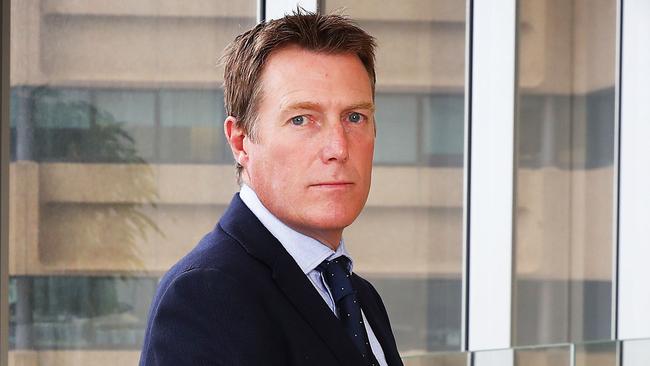New A-G Christian Porter retreats on spy laws
The Turnbull government will rewrite its treason laws to offer a limited freedom-of-speech defence for journalists.

The Turnbull government will rewrite its treason laws to offer a limited freedom-of-speech defence for journalists and media companies obtaining classified documents, while elevating the crime for a commonwealth officer to leak them, potentially restricting access to sources.
However, it has refused to offer blanket exemptions for journalists, who would still face potential criminal charges in the course of their work for reporting on classified government material.
With the government under fire from the legal fraternity and media executives over sections of its espionage and foreign interference laws, Attorney-General Christian Porter has raised the bar for prosecution, making it a crime only if the reporting endangers public safety, interferes with an ongoing criminal investigation or jeopardises national security.
The government said it was making special provisions for journalists by creating two separate classes of offences: one that would tighten the noose for commonwealth officers; and a different and lesser class of crimes for non-commonwealth officers, including journalists.
In an attempt to inject a freedom-of-speech defence, the government says journalists would no longer be required to justify a report as “fair and accurate”, but would have to demonstrate they believed publication was in the public interest.
The government attempted to rush the treason laws through parliament in the final sitting days of last year, prompting a firestorm of protest. It has since conceded that the laws were flawed.
The opposition has threatened to block any legislation that does not offer protection for journalism. ASIO and the Australian Federal Police have argued that the laws are not about targeting journalists but are critical to targeting espionage and foreign interference, which has reached a higher level now than during the Cold War.
Media organisations are concerned the new laws could lead to journalists being charged for merely receiving information. Universities have also warned the laws could hinder research.
Media executives remain concerned that the refusal to exempt journalists means they would be at the mercy of the courts in defending publications.
Legal experts said the definition of “national security” was so broad that journalists could trigger the offence without even knowing.
The Law Council of Australia was not convinced the redraft dealt with all the unintended consequences. “The Law Council’s concerns are with the depth and breadth of the provisions and the unintended consequences that flow from them,” said president Morry Bailes.
“Although we haven’t seen the exact details, in a general sense these proposed amendments certainly appear to be a step in the right direction. The government’s intention to narrow some of the critical definitions is particularly welcome and something that the Law Council has strongly recommended.”
The council said that, in relation to non-commonwealth officers, it welcomed the attempts to “narrow the scope but it is essential that there be a harm requirement to ensure that the offences apply only to the most serious and dangerous conduct”.
Mr Porter described the changes as refinements and said more could be considered when the parliamentary joint committee on intelligence and security reported back on the laws in late March.
“The Prime Minister, in his discussions with me, has made clear the absolute need for this legislation to protect Australia, but also his concerns that the drafting of this legislation must clearly match the government’s intent not to unnecessarily restrict freedom of communication,” Mr Porter said. “There is not, nor has there ever been, any plan ... by the government to see journalists going to jail simply for receiving documents and that would not occur under this bill as currently drafted.”
Robert Todd, a media law expert and partner at Ashurst, said the proposed amendments sounded “like an improvement” but he would need to see what the department came up with.



To join the conversation, please log in. Don't have an account? Register
Join the conversation, you are commenting as Logout